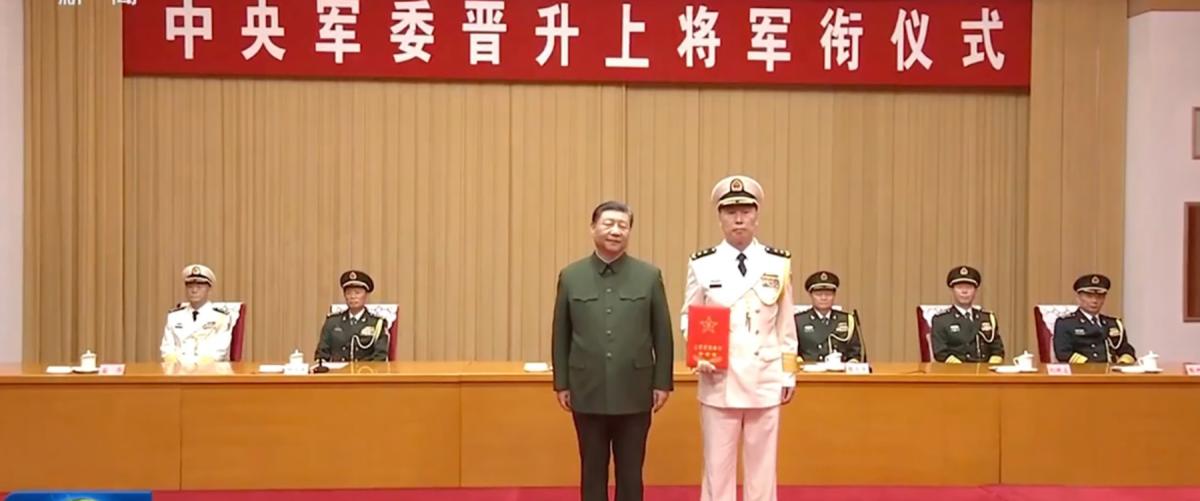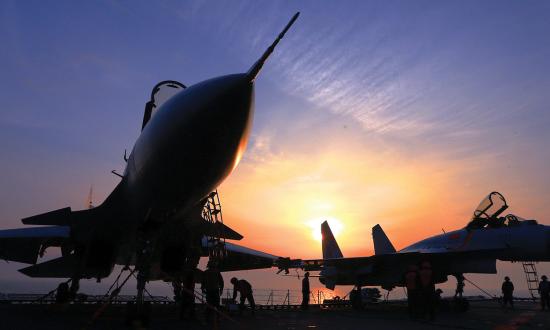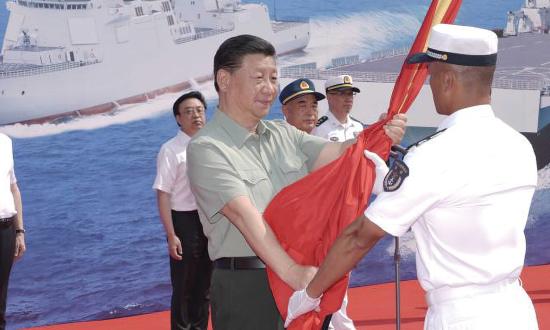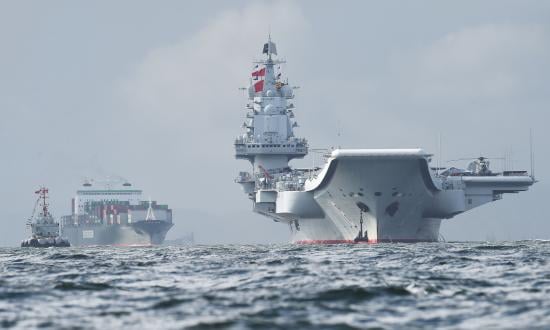Update: This article was published on 28 December 2023. A few hours later, Chinese state media reported on the appointment of former PLA Navy Chief Dong Jun as China's new defense minister, the first possible explanation listed below, under the heading "Why Hu Now?"
A career submarine officer, Admiral Hu Zhongming, has assumed command of China’s People’s Liberation Army Navy (PLAN). This unexpected move may be an indication of future PLAN priorities, part of an ongoing PLA leadership crisis, or an indication of unacknowledged issues in the PLAN.
On 25 December 2023, Admiral Hu was identified as the new Commander of the PLAN. Hu replaces Admiral Dong Jun, who had been commander for only two years of what is normally a five-year tour. There are currently no outward indications of a loss of confidence in Admiral Dong or a crisis in the PLAN. Admiral Hu’s ascent may indicate that Dong will soon assume a new position. Still, the opacity surrounding PLA decision-making holds out the possibility that Hu was given command to take the PLAN in a different direction.
Hu Zhongming’s elevation to leader of the world’s largest navy may have come as a surprise to the PLAN itself. As of this writing, there has been no public change-of-command ceremony nor has there been a formal announcement explaining Admiral Dong’s replacement. Instead, China’s official military newspaper, the PLA Daily, published a very short article stating matter-of-factly that “Navy Commander Hu Zhongming” had been promoted to Admiral by Chairman Xi Jinping. Admiral Dong was not mentioned in the PLA Daily article at all, but Dong was seen on state television attending Hu’s promotion ceremony, suggesting he has not fallen from grace and that the change to Hu’s leadership will be orderly.
Chinese military politics have always been a black box to Western PLA analysts. The lack of transparency about senior officer placement has been exacerbated recently by an ongoing leadership crisis infecting the Chinese military. In July 2023, the commander of the PLA Rocket Force (PLARF) and several other senior PLARF officers were abruptly removed from their posts. The PLARF is responsible for China’s land-based nuclear weapons as well as its substantial conventional missile arsenal. When asked about the shake-up, a PLA spokesman responded, “We will investigate every case and crack down on every corrupt official.” The former PLARF commander, General Li Yuchao, was replaced by a PLAN Deputy Commander, Admiral Wang Houbin. Curiously, Admiral Wang has no apparent experience with nuclear weapons or ballistic missiles. Wang’s most desirable quality seems to be that he is not a senior PLARF officer, raising questions about how deep the rot may go within the Rocket Force.
The PLARF purge likely presaged the disappearance from public view of China’s Defense Minister, General Li Shangfu, in August 2023. There was widespread speculation that Li had come under investigation for corruption linked to his 2017–22 position as head of the PLA Equipment Development Department, which is responsible for weapons procurement. In a potentially related disappearance, General Ju Qiansheng, the commander of the PLA Strategic Support Force, which is responsible for space and information warfare capabilities, has also not been seen in public since August. In October, the PLA finally announced that Li had been removed as Defense Minister. Since Admiral Hu Zhongming’s promotion to PLAN Commander, there is speculation bubbling across the Chinese internet that his predecessor, Admiral Dong, could be named as Defense Minister. If that comes to pass, it would be the first time a PLAN officer has served in the role.
Based on limited available information, Admiral Hu Zhongming brings a wealth of operational, command, and administrative experience to command the PLAN. Hu is the tenth PLAN Commander in the service’s 74-year history but is not the first submarine officer to hold the job. PLAN commanders Admirals Zhang Lianzhong (1988–96) and Zhang Dingfa (2003–06) were submarine officers. Hu’s three immediate predecessors, serving between 2006 and 2023, were surface warfare officers.
About Hu
Hu Zhongming was born in 1964 in the port city of Qingdao, China, home of the PLAN’s North Sea Fleet, now called the Northern Theater Navy. Hu joined the PLAN as a submarine officer in 1979. Little is known of his early career. In 1996, Hu reportedly commanded “Great Wall 11” also known as Great Wall 311, a Type 035 Ming-class submarine in the South Sea Fleet. The diesel-electric Mings were built by China in the 1990s and early 2000s based on a 1960s-era Soviet Romeo-class design. In 2002, Hu Zhongming—probably a captain at that point—participated in the PLAN’s first around-the-world cruise, though not on a submarine. Hu may have qualified as a surface warfare officer on either the destroyer or its accompanying auxiliary during the cruise, but there are no indications he led the formation. Hu’s selection to participate in such a historic international event was the first indication that Hu was being groomed for senior leadership.
Some Chinese language articles indicate that, in 2004, Hu Zhongming may have commanded the first Jin-class nuclear-powered ballistic-missile submarine (SSBN). By 2008, Senior Captain Hu likely commanded an SSBN crew, the 41st crew team identified by the military unit cover designator (MUCD) 92730 Unit, 90th Detachment (92730 部队 90 分队). In 2012, Hu’s SSBN crew probably participated in a series of successful missile tests for the JL-2 submarine-launched ballistic missile. At the time, the JL-2 program was troubled and years behind schedule. In 2013, Hu’s unit received a rare PLA first-class collective merit award, probably for the successful JL-2 tests. In 2013, Hu assumed command of the Southern Fleet’s Yalong submarine base, home port to all the Jin-class SSBNs. He was promoted to rear admiral in 2014.
In 2015, then Rear Admiral Hu was assigned to the PLAN Staff in Beijing. As Deputy Chief of Staff, Hu Zhongming served as the executive director for a high-profile China-Russia exercise “Joint Maritime–2017.” Hu received additional international exposure at the 2019 Galle Dialogue, a Sri Lankan–hosted maritime forum, where he presented an interesting paper calling for greater maritime security cooperation in South Asia. In late 2019, Hu was promoted to vice admiral and given command of the PLA’s Northern Theater Navy. In 2021, he became the PLAN Chief of Staff. Hu returned to the international stage recently when he led a PLAN delegation to South Africa in September 2023.
Why Hu Now?
Admiral Hu’s operational and leadership experience, especially his international exposure, make him a highly qualified candidate for PLAN Commander—the question is merely, “Why now?” There are three possibilities:
First, the possibility of a new job for Hu’s predecessor, former PLAN Commander Admiral Dong, as Defense Minister. Of concern to the United States and its allies, this possibility portends increased ties between the PLA and Russian military. Dong has long been engaged with Russia. He has led previous China-Russia exercises in the Mediterranean and the western Pacific. Most recently, in July 2023, Dong hosted the Russian Navy chief, Admiral Nikolai Yevmenov, to discuss possible cooperation in naval training and shipbuilding.
Second, a focus on submarine development. Hu Zhongming may simply be the flag officer that Xi Jinping wants leading the PLAN at this time. There are myriad indications that the PLAN is building infrastructure and shipbuilding capacity to expand its nuclear submarine inventory. Admiral Hu appears to have the requisite experience, accomplishments, and focus to lead PLA improvements in undersea warfare, including the integration of uncrewed underwater vehicles (UUVs), and the development of new classes of nuclear-powered attack submarines and SSBNs. Here too, Hu’s experience with the Russian Navy may be a cause for concern.
The most likely rationale for Hu’s promotion is some combination of these first two possibilities.
There is, however, a third possibility. This, admittedly, is a rumor-fueled, media-hyped outlier, but it still merits attention: Something has gone terribly wrong in the PLAN.
In August 2023, reports appeared in dark corners of the Chinese internet that the PLAN had suffered a serious submarine casualty. Then, a British tabloid, citing intelligence sources, revived the story in October, stating that the August incident had resulted in the loss of 55 submarine sailors to hypoxia following an underwater collision. These reports have been questioned—and largely dismissed—for lack of any corroborating evidence. That said, there is a possibility, however remote, that the PLAN did indeed suffer a significant submarine casualty, even if it did not result in the reported loss of life.
For historical context, in 2003, a mechanical malfunction on board a Chinese Ming-class submarine resulted in the death of all 70 crew members. As a result of that accident, PLAN Commander Admiral Shi Yunsheng was relieved and replaced with a submarine officer, Admiral Zhang Dingfa. Another recent incident was a November 2023 social media video of massive plumes of black smoke billowing from a PLAN amphibious ship. The video was summarily dismissed as a test of an onboard smoke-screen system. Occasionally, however, where there is smoke, there is fire.
If Hu Zhongming’s predecessor, Admiral Dong, reappears in the PLA ranks, the third possibility of an unacknowledged catastrophic PLAN incident can likely be dismissed. If Dong does not reappear, there is a possibility that Xi Jinping did, in fact, lose confidence in his navy commander for an actual incident or other perceived shortcomings. Regardless, the black box that surrounds senior PLA appointments means that only time, scrutiny, and analysis will reveal why Admiral Hu Zhongming was selected to lead the PLAN—and what course he will chart to develop and employ his force.






